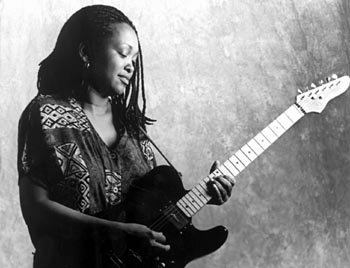
She Can't Lose: Guitarist Deborah Coleman brought a woman's touch to the blues.
The year's best hip-hop, rap, blues and ennui-rock albums
By Nicky Baxter
ORIGINAL MEMBERS OF the Native Tongues posse, the Jungle Brothers energized hip-hop a decade ago with a new kind of blackspeak--call it East Coast Ebonics. Raw Deluxe (Gee Street) finds the group returning to rhythms and grooves that drew De La Soul and A Tribe Called Quest to their cause in the first case.
Raw incorporates elements of blue-shaded jazz and back-in-the-day rap beats. The album is a seductive marriage of moods, messages and a variegated sonic palette all cleverly interwoven to produce a seamless, compelling whole. From start to stop, the Jungle Brothers display Native Tongues of silver.
Moving from Harlem to Chicago, One Day It'll Make Sense (Relativity) finds Common back after a three-year absence with burbling hip-hop beats and sometimes sobering lyrics. Featured guests include the Fugees' Lauryn Hill and Erykah Badu, but this is Common's time and he uses it well, as the single "Accept Your Own & Be Yourself" so ably shows. Like the Jungle Brothers, Common isn't afraid to stir up the sonics with chill jazz and sultry R&B. One Day challenges us to rediscover the higher being within.
Improvisational music, increasingly employed to juice up rap, found itself still grappling with the past as the genre's old school continues to dominate the present. Horace Silver's A Prescription for the Blues (Impulse) was the perfect palliative for fans in search of tough-minded music. Showcasing mostly Silver originals, Prescription features a stellar lineup and hard-grooving tunes roiling with passion and sparkling with precision. "You Gotta Shake That Thing" and the title track romp like wild young things.
Blues, rap's next of kin, was well-served this year with a much-needed young woman's touch. Deborah Coleman's I Can't Lose (Blind Pig) doesn't attempt to replicate ancient history. Coleman's style, while respecting the past, is unequivocally contemporary. The ex-R&B musician's roots in urban blues and rock are in full evidence here.
Songs such as the self-penned "The Man Is Mine" and "Feelin' Alright" show off Coleman's dexterity at churning out uptown R&B replete with pungent guitar riffs and Coleman's husky alto. Coleman's approach to guitar playing is aggressive; at times, her attack resembles Albert King's, at others, T-Bone Walker's. Unlike, say, Buddy Guy, however, she rarely overplays and never allows histrionics to get in the way of a good song.
Book of Spells (Pointblank), the auspicious debut by the Boneshakers, can also be accused of splicing genres. The album jump-cuts from '60s-style soul to rock to gritty funk and back again without missing a beat. A supercharged revision of James Brown's "Cold Sweat" serves notice that these musicians come to funk. Randy Jacobs pulls a Stevie Ray Vaughan number on guitar, producing snarling wah-wah-pedal rhythms and black-cat moans. Elsewhere, the spirit of Jimi Hendrix is invoked. Meanwhile, singer Sweetpea Akinkson's vinegar-and-piss vocal is a primal urge. Rock? Funk? Soul? Who cares? Book of Spells bops mightily.
ON THE ROCK FRONT, wizened vets like Iggy Pop and young brats like Ultrabreakfast showed that youth and age remain the music's yin and yang. For those who missed Iggy in his prime, hearing him rip it up on a live recording is the next best thing. King Biscuit's Iggy Pop caught him in concert in 1988 during his "rock & roll" period. It features 16 great tunes, including supremely rancorous versions of "Search and Destroy" and "I Wanna Be Your Dog." Nevermind the Sex Pistols, this is punk with real spite.
I admit, I like ennui-riddled bands with a penchant for allowing their guitars to whine and drone. Ultrabreakfast's Ice Cream Tricycles is just one more exercise of its kind, but songs like "Cacophone" possess enough treble and buzz to keep the kids shaking all over. Lethargic as a chronic depressive after a restive night, "Cacophone" is a noisy riddle. Lines like "Wish I was an trapezoid--I could be your folding boy" scream with self-pity, but the accompanying cacophony pulls you into an eerily comforting whirlpool of grainy guitar, humming bass and stuporous drumming--and you feel fine.
[ San Jose | Metroactive Central | Archives ]
![[Metroactive Music]](/music/gifs/music468.gif)